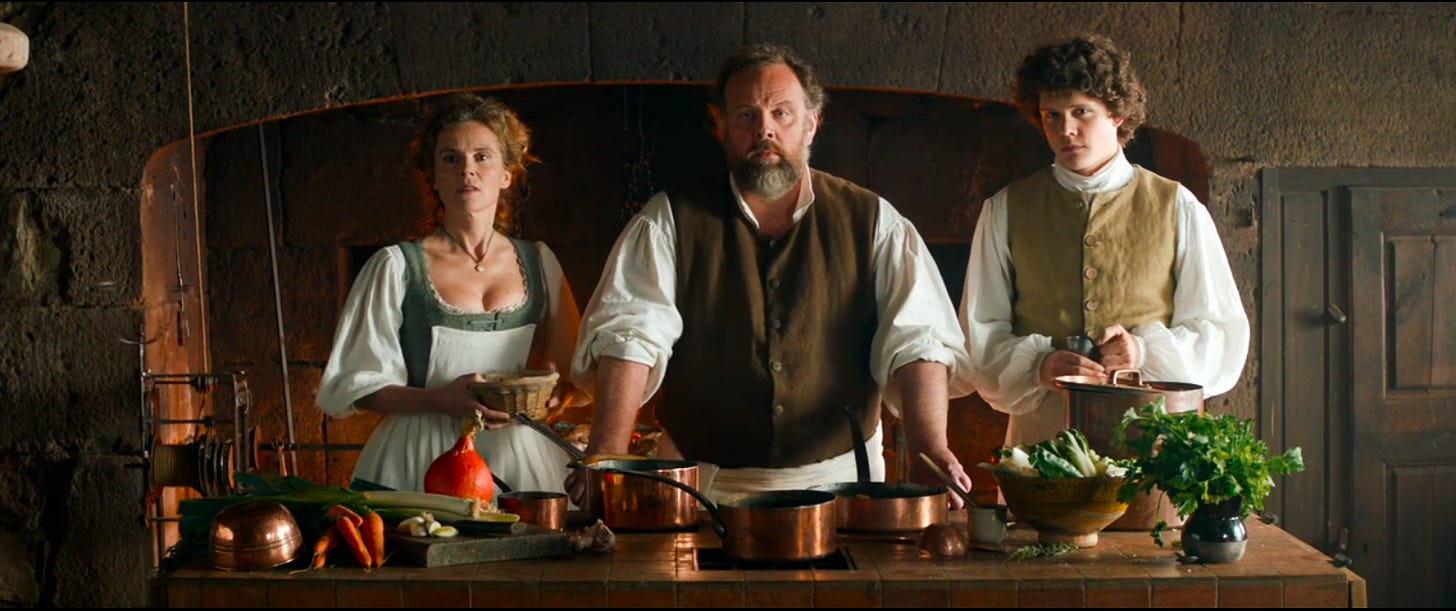Delicieux (2021)
Cooking is a sensory experience, and I don’t mean that in a Like Water For Chocolate kind of way. We all well know this. The smells, the textures, the sounds, and the weight of food when it’s cooking and plated are all are part of the eating process because it signals to the body that sustenance is coming. The mouth waters and the body prepares to digest whatever’s eaten.
Food carries emotional weight as well. A meal, gourmet or otherwise, is a sign of caring for others. It inspires gratitude and longing for food’s mere presence, as anyone who has ever wondered where their next meal is coming from can attest. Cooking can show a person’s character and discernment, because if something doesn’t turn out quite right, we have to choose between throwing in the towel or figuring out how to improve. It can be a school of life.
In Delicieux, food is an emblem of character, presented in a graceful, tantalizing way that keeps the viewer engaged without laying anything on too thickly.
It’s just before the French Revolution. Manceron is the chef at the house of the Duke of Chamfort. He has his own ideas about cooking that still seem very modern to today’s palates, such as planning a meal like a dance and using simple, earthy flavors to bring out the taste of food instead of masking it. He’s not a fan of cinammon, especially as a spice rub on meat, and puts the unwise sous chef who tries to sneak it into the menu on dish duty.
Manceron gets fired because he has the audacity to introduce a hand pie appetizer without giving the Duke prior warning. It contains potatoes, which are only fit for pigs as far as the aristocracy are concerned, never mind that some of those potatoes are notoriously pricey black truffles. The Duke laughs his head off before verbally giving Manceron his walking papers.
Thoroughly rejected, Manceron and his teenaged son, Benjamin go to his dad, Jacob’s house in the country, where he works at various farming projects in between brooding sessions. Benjamin thinks that his dad shouldn’t give up because the world is progressing. Men are floating in the sky in hot air balloons, for heaven’s sake. Manceron has a future.
Our hero doesn’t believe him and continues to stew, but then a woman, Louise shows up asking to be his apprentice. She claims to have worked as a jam cook and pays Manceron her whole life savings by way of convincing him to teach her. Manceron is reluctant at first because he says he doesn’t cook anymore and women shouldn’t be chefs anyway. Louise wears him down, though. She’s got a story which will come around when the time is right. Until then, she and Manceron will attempt something very daringly egalitarian: Opening a restaurant.
Delicious is not long on exposition, at least not the verbal kind, and it’s not about the food porn. Instead, we get mise en scene flashes that look like still-life paintings, but with a twist, such as a candle going out or a bubble floating across the tableau. Other than that, food isn’t made much of unless it directly affects the story.
There’s a lot of deliberate space in the early scenes of the film. The distance that the help has to walk between the kitchen and the dining room seems to get longer and longer, wordlessly communicating how little the Duke and his upper class friends know about the effort and time Manceron puts into his creations. The kitchen is dark and in various shades of brown while the dining room is garishly bright, as are the diners, all of whom sport the ridiculous styles that characterized French aristocracy in the late eighteenth century.
As Manceron begins to do his own thing, however, space, light and dark merge to the point that the Duke is the one in the dark and Manceron is the one in the light. Crafting a meal no longer happens in far away downstairs rooms but right alongside those enjoying the finished product. It’s very personal and pleasurable.
It’s also not historically accurate. While Manceron’s restaurant is presented as revolutionary and crazy, eateries have existed for as long as there have been cities. Granted, restaurants have evolved over the centuries and the French are among the pioneers of modern restaurant culture, but that took place after the French Revolution, not before.
The only other part of the movie that’s a little weak is when (spoiler alert) Jacob dies suddenly. It’s so quick that it takes a minute to realize what’s going on, not to mention they don’t say his name once during what seems to be his funeral scene. It’s a little weird; I guess the filmmakers just wanted to eliminate his character. Fortunately it doesn’t hurt the film too much.
Delicieux might not be entirely historically accurate, but it’s a wonderful movie that will make anyone who watches it hungry for both cooking and eating. It’s quietly and beautifully addictive.
Delicious is currently streaming on Amazon Prime. Not rated.
My grade: A+
Principal cast: Gregory Gadebois, Isabelle Carre, Lorenzo Lefebvre, Christian Boulette, Benjamin Lavernhe, Guillaume de Tonquedec
Directed by Eric Besnard.
Written by Eric Besnard and Nicholas Boukhrief.




